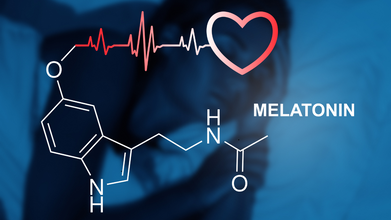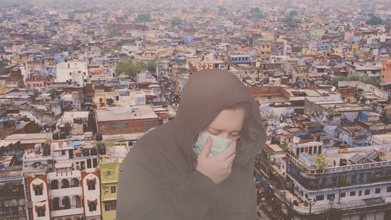- Health Conditions A-Z
- Health & Wellness
- Nutrition
- Fitness
- Health News
- Ayurveda
- Videos
- Medicine A-Z
- Parenting
- Web Stories
Gluten May Not Be Reason Behind Your Bloating, Lancet Study Reveals The Real Culprit That Makes You Leave Bread

(Credit-Canva)
A new study published in the Lancet says that feeling sick after eating foods with gluten often has nothing to do with gluten itself. Instead, it’s about a complicated communication problem between your gut and your brain.
Over the years we have seen many people avoiding gluten. According to NYU Langone Health, one-third American avoid gluten due to health concerns, but is gluten really such a big cause of concern for health?
This condition, called Non-Celiac Gluten Sensitivity (NCGS), affects many people around the world, and these new findings will completely change how doctors understand and treat it.
The researchers from the University of Melbourne looked at lots of previous studies to figure out why people who don't have Celiac disease still feel bad after eating gluten. Common complaints are feeling bloated, having stomach pain, or feeling tired. The lead researcher says these results challenge the old ideas we had about what causes the sensitivity.
Is Gluten The Culprit Behind Bread Bloating?
The research reveals that it is not due to gluten. The study found that for most people who think they are gluten sensitive, their symptoms are actually being caused by two main things:
FODMAPs (Fermentable Carbohydrates)
These are types of carbohydrates found in many foods, including wheat, that are hard for some people to digest. They ferment in the gut and cause gas and bloating. The study found that these are often the real cause of discomfort, not the gluten part of the wheat.
Psychological Reasons
Researchers found that people’s symptoms were often triggered by what they expected to feel after eating the food. In many tests, people who thought they were reacting to gluten felt just as sick when they were secretly given a placebo, which is a fake, gluten-free substance, as when they were given real gluten. This shows that your brain's expectation plays a huge role.
Is Bread Bloating Only Due to Gluten Sensitivity?
The researchers concluded that we should stop thinking of NCGS as a problem with gluten and start seeing it as a communication breakdown between the gut and the brain. Because the symptoms are so similar, they say NCGS is more like Irritable Bowel Syndrome (IBS), which is a condition where the gut and brain don't communicate properly.
When people who have IBS and think they are sensitive to gluten eat gluten, wheat, or a placebo, they often react the same way to all three. This strongly suggests that how a person anticipates and processes sensations in their gut is heavily influencing their symptoms. This new view will help doctors stop focusing only on gluten and start treating the underlying communication problem.
Doctors now have better information to help patients. Experts say this new knowledge is essential for making better diagnoses and creating personalized treatment plans for each patient.
The study strongly suggests that public messages should stop telling people that gluten is automatically bad for their gut, because the research shows that is often not true. We need to change the public message about gluten.
The researchers suggest that effective treatment for people with NCGS should include not only changing their diet but also psychological support to manage their gut-brain interaction.
It’s also important to make sure people are still getting all the nutrients they need. The authors also want to see better testing tools, stronger guidelines for doctors, more funding for research, and clearer food labels.
Can Breathing Polluted Air Affect Blood Sugar During Pregnancy?

Credits: GEMINI
The air quality in many Indian cities has reached worrying levels, with thick smog and high pollutant concentrations now a part of daily life. In Delhi, the situation has turned severe, with air quality dipping to its lowest point of the season. A dense layer of smog has settled over the city, and temperatures have fallen well below the usual range.
While toxic air is dangerous for everyone, it poses an even greater threat to vulnerable groups, one of them being pregnant women. So, how exactly does pollution affect them? To understand this better, we spoke with Dr. Ashish Saini, Consultant Endocrinologist at Kailash Hospital, Noida, and Sonia Mehta, Nutritionist and Founder of EverBloom, who explained the impact in detail.
How Does Air Pollution Affect Pregnancy?
Air pollution can directly affect both the mother and her developing baby. According to ScienceDirect, pollutants such as fine particulate matter (PM2.5), nitrogen dioxide, and carbon monoxide enter the lungs and pass into the bloodstream when inhaled. Once in the blood, these harmful particles can reach the placenta—the organ responsible for supplying oxygen and nutrients to the baby.
This exposure may reduce the amount of oxygen available to the foetus and trigger inflammation in the mother’s body, disrupting normal placental function. Over time, such changes can increase the risk of pregnancy-related complications like restricted foetal growth and high blood pressure.
Air Pollution and Pregnancy: Can It Lead to Gestational Diabetes?
Growing research points to a strong link between long-term exposure to polluted air and metabolic problems such as gestational diabetes. Pollutants like PM2.5 and nitrogen dioxide, commonly found in city smog, can cause oxidative stress, hormonal imbalance, and chronic inflammation—all of which can interfere with insulin sensitivity.
Dr. Ashish Saini explained, “These physiological changes can make expectant mothers more prone to glucose intolerance. For those already diagnosed with gestational diabetes, continuous exposure to polluted air may lead to unstable blood sugar levels and raise complications for both mother and baby. As pollution worsens in the winter months, it becomes vital to stay cautious and take preventive measures.”
Why Are Pregnant Women More Vulnerable To Air Pollution?
Polluted air is often described as a silent hazard for women’s health, and pregnancy makes women especially sensitive to its effects. For expecting mothers managing gestational diabetes, breathing in polluted air can worsen oxidative stress, inflammation, and metabolic disruption. This can increase the chances of high blood pressure, early delivery, and other health risks for both mother and child.
Nutritionist Sonia Mehta highlighted the importance of nutrition as a protective factor: “A balanced diet can help reduce these risks. Expectant mothers should include a variety of colourful fruits and vegetables rich in vitamins C and E, add walnuts or flaxseeds for omega-3, opt for whole grains such as oats or brown rice, and include dal, paneer, or eggs for protein.” These nutrients help fight inflammation and support healthy insulin activity.
Precaution Steps for Expecting Mothers During Air Pollution
On days when smog levels are high, it is best to stay indoors, use a good air purifier, and opt for light exercises such as prenatal yoga or simple stretches on the balcony instead of outdoor walks. Small, everyday decisions can go a long way in protecting both mother and baby from the silent harm caused by polluted air, as per Sonia Mehta.
Dr. Saini recommends limiting outdoor exposure during peak pollution hours, ensuring proper ventilation at home, and using well-fitted masks. A diet rich in antioxidants, safe indoor physical activity, staying hydrated, and regular glucose monitoring under medical guidance can further strengthen metabolic health.
Air quality awareness should be an essential part of prenatal care. Taking these steps not only safeguards maternal health today but also shapes a healthier future for the next generation.
Study Links Sleep Supplement Melatonin With Heart Failure; Experts Ask Not To Panic

Credits: Canva
Health and Me had previously reported about the findings from an unpublished study that linked the long use of melatonin, a sleep inducing hormone, and often used as a supplement for the same with heart failures. However, experts are now asking the public to not panic. Their message is simple: this early research is not a reason to toss out your melatonin just yet.
The study, based on health records from more than 130,000 adults with chronic insomnia, found that people who took prescription melatonin for over a year had a higher likelihood of heart failure, hospitalization and death over a five year period compared with those who didn’t take the supplement.
However, the experts who are now reviewing the findings say that the research has major gaps and should be seen as an initial sign and not as a definitive warning.
This Is Not A Melatonin Crisis
As reported by the Washington Post, the spokesperson for the American Academy of Sleep Medicine, Dr Muhammad Rishi, who reviewed the research, called the findings "provocative". However, Dr Rishi stressed that electronic health records can’t establish cause and effect. Other cardiologists echoed the sentiment, noting that melatonin has long been considered safe and even potentially beneficial for heart health because of its antioxidant properties.
This study, they say, is the first to suggest the opposite. One study alone is not enough to overturn years of research, especially when it hasn’t yet undergone peer review.
Joyce Oen-Hsiao, a Yale cardiologist, pointed out that people with chronic insomnia often have elevated risks for heart problems even without medication. Poor sleep itself raises heart rate, disrupts blood pressure and increases cardiovascular risk. So it’s entirely possible that insomnia, not melatonin, is the real culprit behind the outcomes seen.
What Did The Study Do In Its Analysis?
Researchers analyzed an international electronic-health-records database, looking at adults diagnosed with insomnia. About half had a record of being prescribed melatonin and reported taking it for at least a year.
Across five years, roughly 3,000 long-term melatonin users developed heart failure for the first time, compared with nearly 1,800 people listed as nonusers. The team matched melatonin users with nonusers to account for age, sex and other health conditions.
But here’s the catch that experts keep flagging: the “nonuser” group probably included plenty of people who did take over-the-counter melatonin but didn’t mention it to their doctors. In the United States, melatonin is sold as a supplement, not a regulated drug, so people often take it without any record in their medical file.
That alone, experts say, could skew the results.
The dose information was also missing, and researchers couldn’t tell whether the prescription melatonin actually improved users’ sleep. If someone continues to struggle with severe insomnia even while taking melatonin, the underlying sleep disorder could be driving heart risks, not the supplement.
Melatonin: To Continue Or Not To Continue
As per experts, you should not discontinue taking your medicines by just basing it off the study. The key is of course to speak to your doctor. However, no one is recommending widespread discontinuation. Experts, instead, are asking people to stay calm, informed, and talk to a doctor if they’ve been using melatonin for a long time, especially at high doses or if they already have heart disease risk factors.
Delhi Air Pollution: As AQI Crosses 700, AIIMS Doctor Suggests 5 Ways To Keep Everyone Safe

Credits: Canva
On November 7, Delhi Air Quality Index (AQI) logged its average pollution levels at 727. Previously, in 2024, on November 18, Delhi logged AQI at 795 (as per the AQI.in data, and reported by several other media outlets). Amid all this, on November 9, Delhiites, including parents, students, activists, and many more assembled at India Gate to hold a protest against the worsening AQI.
As Delhi pollution keeps worsening, it is no longer news that air pollution impacts much beyond just lungs and respiratory system of one's body. It could lead to hormonal imbalance, fertility, skin and hair problems, and even impact bone health.
The situation is of such a gravity that even doctors are now suggesting people to leave Delhi for a while, if they could afford to do so. Doctors are also suggesting people the Do's and Dont's of staying safe in this continuous worsening pollution. One such doctor is Dr Rahul Chawla, a neurologist trained at AIIMS, who, on his Instagram, posted a video where he shared 5 ways one could protect themselves from Delhi's Air Pollution.
Dr Chawla also criticized the government for not taking immediate actions. He said, "While Beijing’s AQI dropped from 754 (2013) to just 47 (2025) after strict climate action, Delhi’s air is getting worse every winter. Schools are shutting, visibility is zero, and people are literally breathing poison. Delhi is converting into a gas chamber. If lockdowns were for COVID, maybe the next one will be for air pollution.”
Five Ways To Keep Yourself Safe
As city becomes 'gas chambers' one needs to be a step ahead to ensure their own safety. Here's what they can do:
Stay Indoors
Dr Chawla suggested that one should stay indoors as much as possible. "You can open the windows and doors only between 1 and 3pm in the day, when you feel that the sun is bright, so that the house gets proper ventilation," he said.
Why 1pm to 3pm is the only time he suggests to have exposure with air? As per a 2023 study by an air filter brand, Delhi's air pollution peaked at 9AM and gradually improved as the day progressed. On an average, Delhi sees roughly as half as much PM2.5 by 5PM. Similarly, in Kolkata, the pollution peaks at 8am and is lowered by 4PM. This is why the safest time to have any sort of air exposure is in the afternoon. Pollution levels also tend to be slightly lower in the afternoon because it is when the sun is at its peak. This heats the ground and causes warm air to rise and mix with atmosphere. This helps disperse pollutants.
He also advised against cleaning inside the house using a dry cloth, and suggested wet cloth to be in use, so that dust does not rise. "Please do not light up things inside the house like burning dhoop (incense for worship), agarbatti (incense sticks), or anything else that causes excessive smoke,” he said.
Use N95 Mask
“If there are elderly people at home, do not let them go for morning walks or evening walks, and if there are children, do not let them play in the park. Exercise at home. You can go up and down the stairs. You can do yoga. If you have a treadmill or a stationary bike at home, you can exercise with it. You can do weightlifting,” he said. However, he suggested that if going out is absolutely necessary, then one must wear N-95 mask properly before stepping out.
Air Purifier
“If you can afford an air purifier, buy one. But keep in mind that the air purifier you are buying should be appropriate for the size of your room,” the neurologist advised.
Work From Home
The neurologist also suggested that if your company permits it, seek work from home option to reduce your exposure from toxic air.
Leave Delhi
Lastly, he suggested that if people can afford, and their profession allows, they must leave Delhi for a few weeks. “Because this city has become a gas chamber,” he warned.
Note: This article is not a medical advice and the information is derived from the video shared by the doctor. Please seek advice from your doctor before making any changes in your lifestyle.
© 2024 Bennett, Coleman & Company Limited

